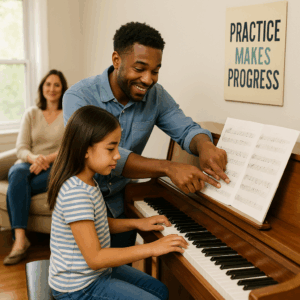When parents actively support music lessons at home, the student’s progress often accelerates—but it’s not because they teach. Real growth comes when parents help with focus, routine, and encouragement in ways that reinforce rather than frustrate lessons.
Three Key Ways Parents Can Support Effectively
1. Establish Consistent Practice Routine
Children benefit most from short, daily practice rather than long, unstructured sessions. Parents can help by:
- Scheduling a fixed practice time (like after school or before dinner)
- Using a simple timer or checklist to build habit
- Applying the “easy-hard-easy” pattern—start with a familiar warm-up, challenge a new phrase, and end on a piece they enjoy
This strategy creates structure without pressure—a balance between discipline and encouragement seen widely in music pedagogy .
2. Observe with Purpose, But Don’t Take Over
Attending lessons—whether in person or virtually—lets parents see learning strategies in action. Being a supportive observer helps reinforce instruction at home:
- Sit beside your child during their practice, noticing what they struggle with
- Prompt gently—“What section is your teacher most focused on today?”
- Ask for the practice notebook or assignment log when it’s unclear
You become a reinforcement partner, not a second teacher. Classroom research shows that children thrive when parents hold supportive presence—offering accountability while trusting the teacher’s role.
3. Celebrate Effort, Not Just Accuracy
Praise is most effective when focused on resilience, persistence, and improvement:
- “I noticed you stuck with that tricky bar even when it was hard.”
- “Great stamina during today’s sight-reading!”
- Set small wins—like playing three clean measures in a row—and celebrate them
Studies show children’s motivation rises when parents recognize growth and effort—even more than flawless performance (reinforcing persistence).
Why This Support Strategy Works
Supporting rather than controlling creates a positive learning environment. When parents helping piano lessons thrive, students build:
- Responsibility: structure teaches planning and follow-through
- Confidence: small wins reinforce motivation
- Persistence: overcoming small challenges builds resilience
Research also reveals wide-ranging benefits from parental involvement in music study. Active engagement improves cognitive performance, memory, language, and self-esteem—especially for young learners in one-on-one lessons (Time study on cognitive gains).
FAQ – Parental Support Guide
Q: How much time should parents spend during practice?
A: Even sitting nearby quietly for 10–15 minutes a day conveys support and helps sustain focus—without overwhelming.
Q: What if parents don’t know music themselves?
A: That’s fine. Asking learning questions, celebrating effort, and keeping a routine are more helpful than giving instruction.
Q: Is it better for parents to practice with kids or let them do it independently?
A: Let independence be the goal—but early on, helpful presence builds structure. Shift gradually toward autonomy as confidence grows.
